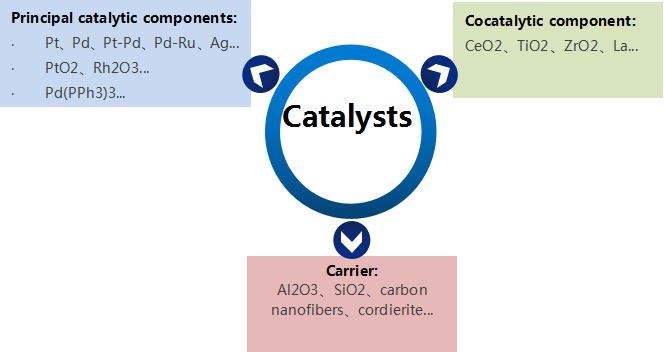The precious metal catalyst is a precious metal material that can change the speed of chemical reaction without participating in the final product. Almost all precious metals can be used as catalysts, but platinum (CAS: 7440-06-4), palladium (CAS: 7440-05-3), ruthenium (CAS: 7440-18-8), rhodium (CAS: 7440-16-6), iridium (CAS: 7439-88-5), gold (CAS: 7440-57-5) and silver (CAS: 7440-22-4) are commonly used, especially platinum (CAS: 7440-06-4) and palladium (CAS: 7440-05-3). It is an important catalyst material because of its high catalytic activity, high-temperature resistance, oxidation resistance, and corrosion resistance.
Composition
Features
² Easy adsorption of reactants, high catalytic activity
² Low heat of formation, weak binding force to oxygen and hydrogen, desorption is fast
² Good thermal stability, a wide range of applicable temperature
² High chemical stability, not easy to be REDOX, not easy to be corroded
² Has a variety of catalytic activities (such as photocatalysis, electrocatalysis, etc.)

Classification
According to the category of catalytic reaction, it can be divided into homogeneous catalysis and heterogeneous catalysis. Homogeneous catalysts are usually soluble compounds (salts or complexes), such as palladium chloride (CAS: 7647-10-1), rhodium chloride (CAS: 20765-98-4), palladium acetate (CAS: 3375-31-3), carbonyl rhodium (CAS: 28407-51-4), triphenylphosphine carbonyl rhodium (CAS: 17185-29-4), rhodium iodide (CAS: 15492-38-3), etc. Heterogeneous catalysts are insoluble solids, and their main forms are wire mesh state and metal state supported by porous inorganic carriers. Metal mesh catalysts (such as platinum mesh, platinum-rhodium alloy mesh, etc.) have limited application range and dosage. Most heterogeneous catalysts are supporting precious metals, such as Pt/Al2O3, Pd/C (CAS: 7440-05-3), Rh/SiO2, Pt-Pd/Al2O3, Pt-Rh/Al2O3, etc. Among all catalytic reactions, heterogeneous catalytic reactions account for 80% ~ 90%. According to the shape of the carriers, the supported catalysts can be divided into particle, ball, column, and honeycomb.
According to the main active metal of catalysts, it can be classified: platinum catalyst, palladium catalyst, rhodium catalyst, ruthenium catalyst and so on.
Application
Due to their irreplaceable catalytic activity and selectivity, precious metal catalysts play an extremely important role in petroleum, chemical industry, medicine, pesticide, food, environmental protection, energy, electronics, and other fields.
Precious metals are excellent catalysts for hydrogenation reduction, oxidative dehydrogenation, catalytic reforming, hydrogenation cracking, hydrodesulfurization, reductive amination, polymerization, coupling, disproportionation, ring expansion, cyclization, carbonylation, formylation, dechlorination and asymmetric synthesis in petroleum and chemical industries.
In the field of environmental protection, precious metal catalysts are widely used in automobile exhaust purification, organic catalytic combustion, CO/NO oxidation and so on.
The precious metal catalyst is the most important part of the development of a new fuel cell.
Precious metal catalysts are used for gas purification in the fields of electronics and chemical engineering.
At present, catalytic technology is one of the advanced technologies, which can also produce huge economic and social benefits.
20%~30% of the gross national economic output of developed countries directly comes from catalysts and catalytic reactions.
More than 85% of the reactions in the production of chemical products are carried out under the action of the catalyst.
Precious metal catalysts have broad application prospects in the research and development of new fields of chemistry.
